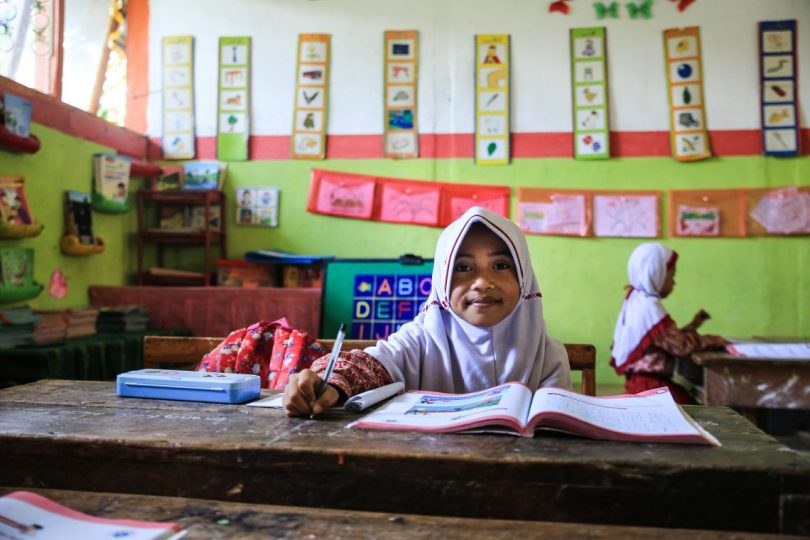Much is made these days of doing development differently, of adaptive programming, and thinking and working politically. Devpolicy Blog featured a series of articles on this topic in September 2018. But do these approaches work?
One program that has embraced adaptive programming is Innovation for Indonesia’s School Children (INOVASI). The program, which began in 2016, is a partnership between the Australian Department of Foreign Affairs and Trade (DFAT) and the Indonesian Ministry of Education and Culture. It is being implemented by Palladium. INOVASI has adopted the problem-driven iterative adaptation (PDIA) approach to help Indonesian government partners find out what works to improve learning outcomes.
In the past two decades, Indonesia has made substantial gains in basic education. Government spending has doubled and enrolment in primary education is close to 100 per cent. The Indonesian government has adopted policies to decentralize educational administration, to introduce school-based management and active learning approaches in classrooms. But, while this spending has improved educational access, it has yet to improve learning outcomes. Classroom practice in most schools has not changed much since the 1950s, and results on international tests (PISA, TIMSS & PIRLS) are worrying. According to a World Bank analysis of 2015 PISA results, 55 per cent of 15 year olds are ‘functionally illiterate’, meaning they can read a text but cannot answer questions related to it. This compares to less than 10 per cent in Vietnam. As Lant Pritchett memorably put it in the title of his book – Schooling ain’t learning.
How to improve learning outcomes? This is the ‘wicked hard’ problem of Indonesian education.
Since the 1970s, the standard approach to education development in Indonesia has been a top-down, one-size-fits-all approach. In-service training modules are designed by experts, based on international ‘best practice’, and cascaded down to provinces, districts and school clusters. The expectation is that this ‘best practice’ will be adopted in schools, and then ‘replicated’, ‘disseminated’ or ‘scaled out’ to others. Could this top-down, ‘best practice’ approach be the reason that the results have been disappointing, that projects have failed to produce sustained improvements to learning outcomes? Could it be, as Guthrie (2018) and others suggest, that foreign solutions may not always be suited to Indonesia’s diverse contexts? In the most comprehensive study of classroom teaching reform ever conducted in Indonesia, Ragatz et al. found that one of the main reasons active learning approaches were not sustained is that they conflicted with the cultural beliefs and practices of Indonesian teachers.
INOVASI aims to build a body of evidence; to find out what works (and, conversely, what doesn’t) to improve literacy and numeracy in Indonesian classrooms, schools and districts – and for this evidence to inform policy and practice. It does this by co-designing and piloting solutions to the challenge of improving teaching and learning outcomes in local contexts. Previous blogs published on this site described INOVASI’s efforts to support transition from mother tongue to Bahasa Indonesia as a language of instruction. Pilots in other districts, including in North Kalimantan, Sumba, Lombok and East Java, have introduced cluster-based training for teachers in literacy and numeracy teaching. Working closely with the DFAT-funded TASS program, INOVASI brings evidence from these pilots to the attention of national policy makers through policy dialogue, seminars and communications events, and takes policy makers to the field to see pilots in action.
One example of how this works in practice comes from INOVASI’s literacy pilot in North Kalimantan. Based on 2017 program baseline data which showed that 85 per cent of children love to read but do not have access to appropriate children’s literature, the program co-designed a pilot with the district of Bulungan to allocate district, school and village funds for books. INOVASI worked with a local university, non-government organisations (NGOs), government and community to train teachers and community members, to increase book supply and to maximize use of the resources in community reading centres, school libraries and district libraries. This pilot highlighted a national policy issue. Very few engaging and age-appropriate books were approved by the Ministry for purchase. Meanwhile, NGOs and commercial publishers are producing a large range of excellent children’s reading material. This issue was raised at national level, approvals were fast-tracked, and policies to improve the process for approving children’s books for purchase by schools were adopted.
So, does adaptive programming work in this context? INOVASI’s pilots suggest that Indonesian children are falling behind their peers in other countries for three main reasons: (1) there is no agreed methodology or space in the curriculum to teach reading in early grades; (2) children and schools lack access to appropriate and engaging children’s books; and (3) many children begin school without fluency in the language of instruction, Bahasa Indonesia. As a result, nearly half of children in grade four are not yet independent readers.
Similarly, children in early grades are not given a solid understanding of numbers before being rushed on to rote-learn calculations. The curriculum moves too fast and is too abstract. As a result, teachers and children are both confused about the curriculum in middle primary classes. These insights, which emerged from early pilots and were tested in subsequent pilots, are now informing local decision making and national policy dialogue around curriculum, book procurement, assessment and continuing professional development.
This emerging evidence is positive. We can say with confidence that adaptive programming, and the iterative, locally-based problem solving approach of PDIA, are helping the Indonesian government to find workable solutions to the ‘wicked hard’ problem of improving learning outcomes for children.



Leave a Comment